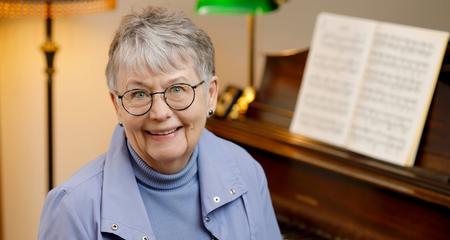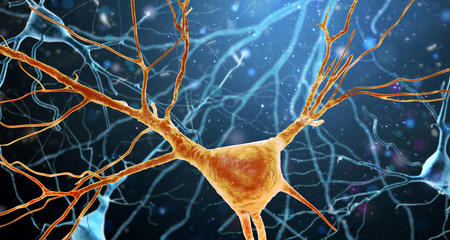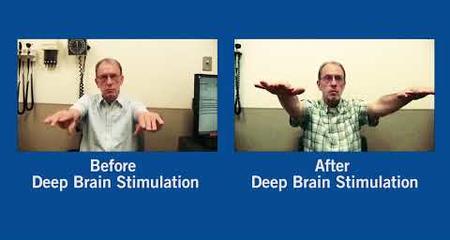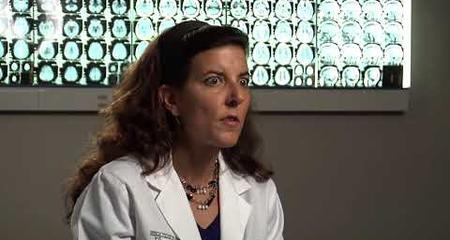Our Parkinson’s Disease and Movement Disorders Program is a world-class resource — combining specialty expertise, state-of-the-science technology and consistent research leadership to provide comprehensive services for all movement disorders. We are dedicated to improving the quality of life for people who face movement disorders. The program offers the broadest range of care options available in the region, helping people with movement disorders cope with physical symptoms, emotional issues, social stigmas and other concerns related to these disorders.
Thanks to the longevity of our program and the expansive knowledge of our physicians, patients with movement disorders of all types can feel confident about finding answers and relief from their symptoms. Experience, research and a history of successful treatment carefully guide all aspects of diagnosis and treatment for each patient.
Part of Our Comprehensive Neuroscience Center
The Parkinson’s and Movement Disorders Program is part of our comprehensive Neuroscience Center. We are a leader in Wisconsin in caring for patients with a wide range of brain, spine and central nervous system disorders. This unparalleled resource offers access to specialty-trained physicians and staff, neuro-imaging technology and treatment options aimed at providing the most effective, evidence-based care for patients.Types of Movement Disorders
Movement disorders are neurological conditions that affect a person’s ability to control the way his or her body moves. Symptoms vary widely from person to person and from day to day. Patients must learn to cope with physical symptoms, as well as emotional issues, social stigmas and other concerns.
In general, movement disorders are caused by changes to regions of the brain that control movement. The cause of these changes is often unknown. The two basic categories of movement disorders are:
- Hypokinetic disorders causing slow or decreased movement
- Hyperkinetic disorders causing abnormal involuntary movement
Experts with the Parkinson’s Disease and Movement Disorders Program are experienced in treating many movement disorders from the complex to the most common, including conditions such as these.
Parkinson’s Disease and Related Syndromes (Parkinsonism)
Parkinson’s disease (PD) and related conditions affect the coordination of muscles and movement. The conditions are chronic and progressive, often causing tremor, stiffness, slow movement and problems with balance/posture. Parkinson’s disease is the result of lack of dopamine production in the brain. Related conditions include:
- Progressive supranuclear palsy (PSP)
- Multiple system atrophy (MSA)
- Corticobasal degeneration (CBD)
- Diffuse Lewy body disease (DLBD)
- Vascular parkinsonism
Essential Tremor, Familial Tremor and Other Tremors
Types of tremor include:
- Essential tremor
- Familial tremor
- Physiologic tremor
- Primary orthostatic tremor
- Task and position-specific tremor
Dystonias
Involuntary movements and long-lasting muscle contractions are telltale signs of disorders known as dystonias. Patients are often challenged by twisting, repetitive movements and abnormal postures. Dystonias include:
- Adult-onset dystonia
- Dopa-responsive dystonia (DRD)/Segawa’s dystonia
- Myoclonus
- Paroxysmal kinesigenic dyskinesia (PKD) and Paroxysmal Nonkinesigenic dyskinesia (PNKD)
- Focal dystonias
- Blepharospasm — affecting the eyelids
- Cervical dystonia (spasmodic torticollis) — affecting the neck and sometimes shoulders
- Oromandibular dystonia — affecting the face, jaw, pharynx and tongue
- Spasmodic dysphonia/laryngeal dystonia/vocal dystonia — affecting the larynx (voice box)
- Writer’s cramp and other task-specific dystonias — occur as a result of performing specific tasks
Ataxia/Gait-Balance Disorders
When parts of the nervous system that control movement are injured or damaged, patients can experience impaired balance and a loss of muscle control in their arms and legs.
Movements can become jerky and walking difficult. This set of symptoms is referred to as ataxia or gait-balance disorders and include:
- Spinocerebellar ataxia (SCA)
- Normal pressure hydrocephalus (NPH)
- Gait disorders/gait disturbances of any cause
Other Movement Disorders
The Parkinson’s and Movement Disorders Program physicians and staff offer comprehensive care for all other movement disorders, as well, including:
- Hemifacial spasm/blepharospasm
- Huntington’s disease and other choreas
- Myoclonus
- Paroxysmal kinesigenic dyskinesia (PKD) and paroxysmal nonkinesigenic dyskinesia (PNKD)
- Periodic limb movement disorder
- Psychogenic movement disorders
- Restless leg syndrome (RLS)
- Spasticity
- Tourette’s syndrome/Tics
- Wilson’s disease
Expertise in Treating Movement Disorders
We are dedicated to improving the quality of life for people who face movement disorders. The program offers the broadest range of care options available in the region, helping people with movement disorders cope with physical symptoms, emotional issues, social stigmas and other concerns related to these disorders.
Movement disorders don’t just affect the person who is diagnosed, so the program actively involves family members in all aspects of care.
For the most complex to the most common movement disorders, our knowledgeable and experienced team offers the full range of leading-edge diagnostic and treatment choices, many found only at an academic medical center.
We’re one of the longest-standing providers in the area, offering patients unique advantages such as:
- Board-certified physicians who are specialists in Parkinson’s disease and movement disorders, with fellowship-training and decades of experience identifying causes and most effective treatments.
- Innovative technology and treatment options including deep brain stimulation (DBS) surgery. Our neurosurgery team has been involved in DBS since its outset, and has performed more than 3,000 DBS procedures.
- Individualized, coordinated care from a team of specialists with expertise in the areas of neurology, neurosurgery, neuropsychology, geriatric neuropsychology, physical and rehabilitation medicine, speech-language pathology, occupational therapy, physical therapy, dietetics, social work, genetic counseling and nursing.
- Active involvement of the patient and family members in treatment planning.
- An academic medical center setting where patients benefit as soon as possible from research advancements related to treating movement disorders.
- A dedication to enhancing quality of life, working to improve all aspects of each patient’s health and wellbeing.
Referrals
Patients may be referred to the Parkinson’s Disease and Movement Disorders Program by their physicians, or they may find a physician by calling 414-777-7700. The program serves many patients looking for a second opinion about their diagnosis and treatment options, and welcomes these requests.
Virtual Visits Are Available
Safe and convenient virtual visits by video let you get the care you need via a mobile device, tablet or computer wherever you are. We'll assess your condition and develop a treatment plan right away. To schedule a virtual visit, call 414-777-7700.
More to Explore





